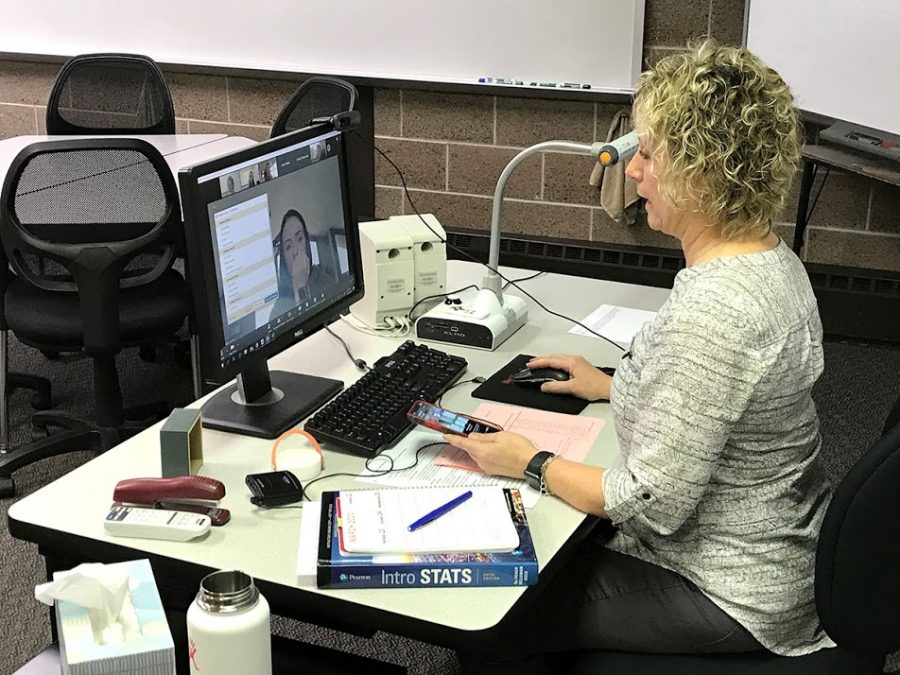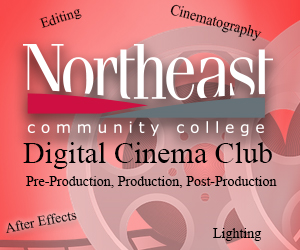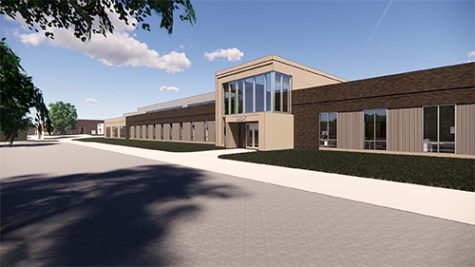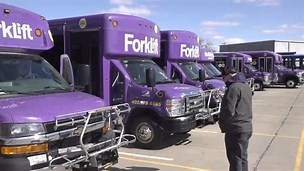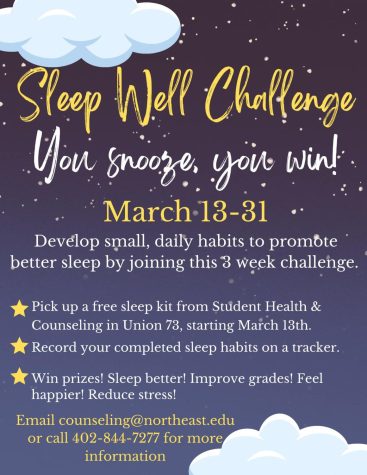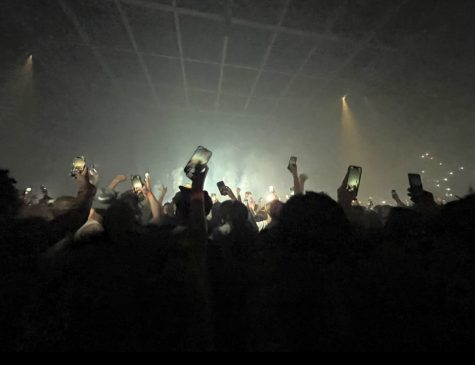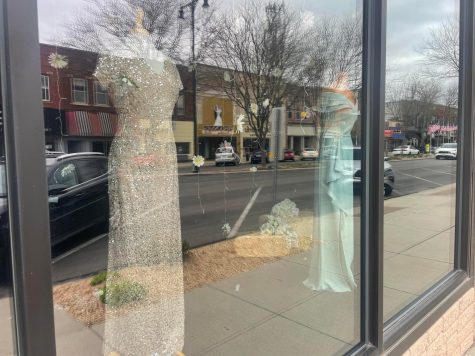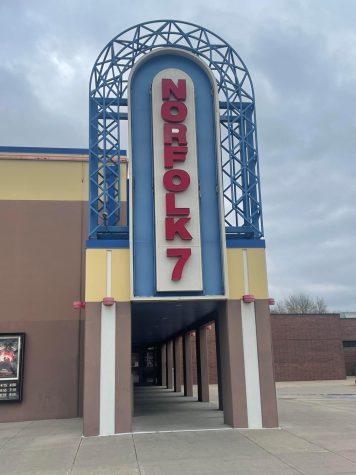Northeast Community College adjusts to a new normal for the remainder of the spring semester
March 31, 2020
NORFOLK – Michael Lynch admits he has not taught an online class before, but the longtime art instructor at Northeast Community College said he’s actually okay with the adjustment in how classes will be taught during the rest of the spring semester.
“It’s a new and exciting challenge and I’m just going to give it my best shot.”
Lynch and his colleagues at the College worked diligently last week to adjust their classes to be offered in alternate formats, primarily online, in light of the worldwide pandemic of the COVID-19 virus, which has virtually changed the way society is operating.
Lynch is grateful for the support he has seen from administration, learning technology staff and fellow faculty members during the transition to an online platform. For someone who doesn’t describe himself as tech savy, he has had to adjust how his students will tender their artwork.
“I’m just going to have them submit everything visually to me because ultimately it is a visual thing. I did have to make some alterations in the elementary art education studio courses and make it more research-based, but the others are pretty much the same,” he said. “I have not used some of the technical tools that other (faculty) typically use, but if this helps facilitate student learning, I’m willing to give it a try.”
Most of the 126 full-time faculty and several part-time instructors are teaching remotely from off-campus, while several others are instructing from their offices on-campus. With the goal of keeping social distancing intact, faculty members have made adjustments to fit their needs.
Michele Gill, interim vice president of educational services, said it shows the spirit of the Northeast faculty.
“This truly showcases the innovation our faculty have provided to their students as they continue to convert their course content to online delivery so that quality instruction continues to be their top priority. Also, instructors have been engaging with their students on a more personal level as a group and have incorporated the important element of human interaction in the learning process.”
Many instructors have used Northeast’s learning management system, called Canvas, to upload videos, course content and other information for their students. A number of faculty are using videos they have created previously that are still applicable today. Others are using cloud-based video conferencing system tools such as Zoom and FaceTime. The transition of going from face-to-face classes to online has brought out the creative side of the instructors.
For the hands-on program physical therapist assistant (PTA), instructor Tere Karella is keeping class times the same, but she has recorded her lectures in Canvas.
“So students have to watch them before we meet at our regular time. We met this morning, went through questions. I did the ‘make sure you look this over’ type of thing and made plans for the type of activities that they would like to do for lab. And lab is probably the hardest thing for us.”
In PTA labs, students will need to have someone serve as a patient in their home and then use FaceTime or Zoom to contact Karella if they have questions as they conduct treatment. They will then get together as a group online, but Karella will meet with students one-on-one if they have additional questions.
“You know; you just have to be creative when it comes to exercise.”
Another challenge for the PTA faculty is when they test their students out in the lab which will need to involve a scenario that each student will need to complete.
“Normally they would do it on a classmate and they are exposed to all of the gym equipment in our lab here on campus, but now we are figuring out how to accomplish that.”
While the delivery method of teaching is different, Karella said the PTA program is working to keep a sense of normalcy the best way it can.
“In my 25-years at Northeast, I have never had to do anything like this. I knew Zoom was there, but I didn’t use it to its full capacity. It has opened my eyes and it may allow us to offer our program in different ways going forward. To be honest, it’s been a fun challenge to figure out how to look at different ways to get through this.”
Drafting Instructor Lynnette Frey is teaching her classes live online. Her courses also meet at the same time as prior to distance learning followed by lab.
“I just leave my Zoom open and they pop in when they have questions,” she said. “We’re using Zoom for all of our regular classes which allows me to show them how to go through a process. Today, for example, they are working on creating floors in a hotel. They watch me do it and then they go and do it themselves and send me screen shots so I can see how they have done it. The day has gone really well.”
Because of the nature of the program, drafting students were allowed to checkout desktop computers from the drafting lab, which now sits empty. Wade Herley, dean of business and technology and Shawn Tillotson, associate dean, assisted Frey in making sure the 31 desktop computers were distributed to students so they could take them home.
“Trevor Bailey (technical support specialist) was definitely key as he created the image to allow all of our software to run on stand-alone computers rather than on a network after we received permission from our software providers to do so,” Frey said.
Frey said she did have to adjust how students would submit their work. While much of it is handled through paper drawings, they now submit everything electronically through Canvas.
The first day back for class for Matt McCarthy was a bit different.
“Students just wanted to talk,” said McCarthy, criminal justice program director and instructor. “And they wanted to see their friends and they wanted to talk to me through video chat. So, we all talked together at the same time.”
McCarthy said the COVID-19 outbreak was discussed in every one of his classes on the first day of meeting online. And for many students, the course work is their top priority right now. He said one student, who has many allergic reactions, has locked himself inside his house, but is grateful to be able to communicate with his classmates.
“I have another student who is taking care of his five-year-old niece because his sister has to work. I have a student who went to Mexico over winter break who has self-quarantined. All of them were telling stories about things they’ve heard,” he said. “And then we just talked about what we’re doing in class.”
McCarthy said he’s had to start from scratch in some areas.
“We have had, basically, two weeks of pandemonium and chaos, so we’re adjusting course content, not grading, since we took our break in early March. The rigor is still there, but a lot responsibility falls on them since it’s all online – and some of these students didn’t take online classes originally for a reason. So we’re making accommodations.”
Michael Roeber, animal science instructor, has adjusted course content in his classes, many of which focus on problem solving. He has recorded videos over the years that address these issues, but they have become a large part of the program now that everything is online.
“Normally, we’ll throw out questions in a face-to-face setting and discuss them among one another. Now, students are having to have those discussions among themselves.”
Another important part of the semester for Roeber and other agriculture instructors is the spring competition season, including the Houston (Tex.) Livestock Show, which was cancelled earlier this month, and the North American Colleges and Teachers of Agriculture (NACTA) Conference that was to be held in Kansas in early April. Roeber serves as president of the organization’s coaching association.
“I’m disappointed for the students,” he said. “Some of them have put in a lot of work to prepare. We’ll never know for sure how our kids would have ranked against other competitors this year.”
Fifty students and faculty members were scheduled to go to the NACTA competition.
John Nelson said his online classes with his freshmen students in the heating, ventilation, and air conditioning (HVAC) program have gone well. While he is teaching classes online, he also encouraged students do one other thing during this extraordinary time – get a job.
“I told them I’m really going to be flexible in order for them to do their assignments online anytime outside of working hours. I have all my classes online in sequential order so they have to do certain steps certain ways. And they have to do it all by Sunday night in order to move on to the next assignment.”
For lab work, Nelson is incorporating the in-the-field job experience.
“For my lab class as we move through the next several weeks, the students will provide me with a weekly report of their hands-on activities and hours spent doing those activities. I told them I have some other ideas that could help go a long way as far as tracking hours,” he said. “I am trying to get a similar number of hours of reasonable experience that they would normally put into a lab class.”
Nelson told his students to “don’t sweat it” if they don’t have any job-related activity going at the present time. He’s confident they will adjust.
“I have been encouraging them to get a job so they can do the on-the-job-type training which can be just as beneficial as any other type of lab activity that they could do.”
Nelson said the sophomore HVAC students, taught by Paul Bailey, came in last week to pick up their tools as their on-campus training has come to a conclusion. He said they were disheartened that their time at Northeast is concluding the way it is.
“You would think sophomores would say, ‘Woo-hoo, I’m done early,’ but they wanted that final piece of the last two-months of their college experience. In a two-year program like this, these guys become such good friends – lifelong friends really. And basically they have had the rug ripped out from underneath them for their last two-months.”
While faculty moved online with their instruction, students who have lived on Northeast’s Norfolk campus moved out. With the social distancing requirement, it was necessary to have the hundreds of students move from the residence halls and apartments back to their homes.
The move out has gone very smoothly over the last week,” said Kurt Kohler, dean of student life and athletics. “Residence Life staff members have been working with students to coordinate those move outs and the students have been very cooperative in coming in and getting their items and moving out quickly.”
Kohler said less than a half dozen students, many of whom are international students and unable to return to their home countries, will be allowed to stay in the residence halls.
John Blaylock, Northeast executive vice president and head of the institution’s COVID-19 Incident Command Team, said he appreciates how all Northeast employees have adapted to the environment the college has been put in because of the COVID-19 situation.
“Who would have thought that just over a week ago we would be in the position that we’re in, but we have come together and have been able to accomplish where we are today in rapid time,” he said. “Many people are working remotely and being productive. Instructors are teaching, students are learning, staff members are supporting and services are being provided the best we can in this environment. Our employees have done just a wonderful job of helping us prepare to be at this stage.”



